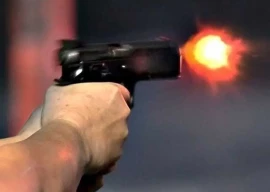In Ramazan, as dastarkhwans are spread out on footpaths across the city at sunset, the charitable organisations that serve the food have noticed a rise in the people who show up for Iftar.
At Saylani Welfare Trust near Teen Talwar, worker Muhammad Bahal says that entire families are now coming out to have Iftar on the streets. "Poverty is forcing people to lock up their houses and come out for free food."
Read: Too many mouths to feed in Karachi’s slum fishermen’s colony
Abbas, a rickshaw driver from Neelum Colony, takes a seat at the dastarkhwan put up for men, while his burqa-clad wife, clutching their child, waits for another one to be set up for women. "We cannot even buy fruits for less than Rs100. How can we have Iftar at home?" he asks. "Here, at least my family can eat properly."
Within minutes, the space for the men is filled up, while a separate carpet is rolled out for a few women. Around 300 to 350 people, mostly from slum areas in DHA and Clifton, are served Iftar and dinner at this centre every day, with the menu ranging from dates, samosas, rolls, apricots and melon for Iftar to biryani and qorma for dinner. "We do not turn anyone away," says Humayan, who is in charge of the process that wraps up by 8pm.
Read: Regular dialysis: Edhi's hospital visit was a routine check-up, says family
The Edhi Foundation, which has been providing Iftar to the needy at its centre near Tower for 15 years, has also seen an increase in popularity for its dastarkhwans. "Inflation has soared and at home, a decent Iftar costs around Rs50 per person," explains Edhi Foundation spokesperson Anwar Kazmi. "These dastarkhwans are the best way to help those who cannot afford it, as we give both Iftar and dinner." Apart from other charitable organisations such as Chhipa and Alamgir Welfare Trust, well-to-do individuals have also set up roadside Iftars across the city.
Near Gizri, Shoaib puts out silver thaals on a table while his friends fill plastic cups with red sherbet. "There are three or four places where my friends and I give out Iftar; the biggest is near Hilal-e-Ahmer, where we serve around 200 people." Muhammad Asif, a worker at a private company who lives in nearby Delhi Colony, is appreciative of Shoaib's efforts. "Because of such people, we can have a good Iftar with pakoras and samosas - did you know that a single samosa now costs Rs15?"
Apart from those who cannot afford it, the roadside Iftars are also ideal for commuters or passers-by, as well as on-duty traffic constables and policemen. Shahzad, a constable, drops by to ask what they have on the menu, though for him, it is more about having the meal with a group of diverse people. "When we all sit together, class differences end."
Published in The Express Tribune, July 11th, 2015.
1731570357-0/elon-musk-(1)1731570357-0-405x300.webp)
-(1)1717678110-0/Kendrick-(1)-(1)1717678110-0-165x106.webp)















COMMENTS (3)
Comments are moderated and generally will be posted if they are on-topic and not abusive.
For more information, please see our Comments FAQ